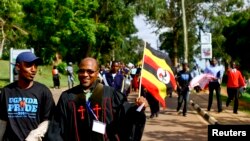KAMPALA —
A U.S.-funded health project in Uganda has suspended operations after police arrested a staff member on suspicion of promoting homosexuality, highlighting the mounting legal risks confronting the gay community in the east African state.
Uganda enacted legislation in February that strengthened punishments for anyone caught having gay sex, imposing jail terms of up to life for "aggravated homosexuality" — including sex with a minor or while HIV-positive.
The United States, one of Uganda's major bilateral sources of aid, and other Western donors have halted or re-directed some $118 million in aid since President Yoweri Museveni signed the law, which also criminalized lesbianism for the first time.
In a notice on its website on Friday, Makerere University's Walter Reed Project, a collaboration between Uganda's biggest public institute of higher learning and the U.S. Military HIV Research Program, said it would temporarily halt its work until it established the legal basis for the arrest.
The project said a Ugandan staff member was taken into custody by police at its offices in Kampala, and released without charge the same day.
It said that "until we have greater clarity as to the legal basis for the police action, the operations of the program are temporarily suspended" to ensure the safety of staff.
Police said they had been following an unnamed individual for days after getting reports he was involved in "gay-related activities," spokesman Ibn Ssekumbi said. "For some time we have been following an individual whom we learnt has been conducting promotion and training activities related to homosexuality."
Ssekumbi said the individual was then arrested, interrogated and released on bond but that an investigation was continuing into the suspect's alleged acts.
A U.S. State Department official said the health project conducts important research into Ebola, Marburg disease and HIV. One of the project's aims is to develop vaccines for these diseases. It has been in operation since 2002.
The project is fully funded by the President's Emergency Plan for AIDS Relief (PEPFAR) through the U.S. Department of Defense, and the annual cost is $9.4 million.
Museveni has accused the West of seeking to impose social imperialism on Africa and told a rally on Monday that Uganda could live without humanitarian aid.
Critics say Museveni may have in part been prompted to back the legal crackdown on gays to shore up support. He is widely expected to seek another presidential term in 2016. He has ruled Uganda since 1986, a nation that now has some of the toughest anti-gay laws on a continent where 37 states ban homosexuality.
Rights groups say the new law is causing discrimination.
"How can Ugandans seek what should be confidential medical services when police appear without a legal basis and question and detain staff?" said Maria Burnett, senior researcher at Human Rights Watch's Africa Division.
Uganda enacted legislation in February that strengthened punishments for anyone caught having gay sex, imposing jail terms of up to life for "aggravated homosexuality" — including sex with a minor or while HIV-positive.
The United States, one of Uganda's major bilateral sources of aid, and other Western donors have halted or re-directed some $118 million in aid since President Yoweri Museveni signed the law, which also criminalized lesbianism for the first time.
In a notice on its website on Friday, Makerere University's Walter Reed Project, a collaboration between Uganda's biggest public institute of higher learning and the U.S. Military HIV Research Program, said it would temporarily halt its work until it established the legal basis for the arrest.
The project said a Ugandan staff member was taken into custody by police at its offices in Kampala, and released without charge the same day.
It said that "until we have greater clarity as to the legal basis for the police action, the operations of the program are temporarily suspended" to ensure the safety of staff.
Police said they had been following an unnamed individual for days after getting reports he was involved in "gay-related activities," spokesman Ibn Ssekumbi said. "For some time we have been following an individual whom we learnt has been conducting promotion and training activities related to homosexuality."
Ssekumbi said the individual was then arrested, interrogated and released on bond but that an investigation was continuing into the suspect's alleged acts.
A U.S. State Department official said the health project conducts important research into Ebola, Marburg disease and HIV. One of the project's aims is to develop vaccines for these diseases. It has been in operation since 2002.
The project is fully funded by the President's Emergency Plan for AIDS Relief (PEPFAR) through the U.S. Department of Defense, and the annual cost is $9.4 million.
Museveni has accused the West of seeking to impose social imperialism on Africa and told a rally on Monday that Uganda could live without humanitarian aid.
Critics say Museveni may have in part been prompted to back the legal crackdown on gays to shore up support. He is widely expected to seek another presidential term in 2016. He has ruled Uganda since 1986, a nation that now has some of the toughest anti-gay laws on a continent where 37 states ban homosexuality.
Rights groups say the new law is causing discrimination.
"How can Ugandans seek what should be confidential medical services when police appear without a legal basis and question and detain staff?" said Maria Burnett, senior researcher at Human Rights Watch's Africa Division.





